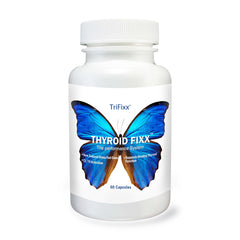Thyroid problems generally result from impairments of the thyroid gland, causing abnormal secretion rates of thyroid hormone. Common thyroid problems include Hashimoto’s thyroiditis, Grave’s disease, follicular thyroid cancer, silent thyroiditis, postpartum hypothyroidism, and anaplastic thyroid cancers. Problems of the thyroid often present with biological abnormalities in the secretion of the thyroid hormones and antibodies in cases of autoimmune reactions. The Thyroflex™ test is an accurate diagnosis method for thyroid problems and also provides a reliable thyroid functioning assessment to evaluate therapy efficacy. The TriFixx™ nutraceutical line provides a proven therapy option as an alternative to conventional medicine use in the management of thyroid problems.
INTRODUCTION: Thyroid Health
Optimal thyroid functioning is no doubt essential for the normal growth and development of the biological system in humans. The thyroid exerts a central controlling effect on the rate of basal metabolism, calcium metabolism, and energy dispensation in the body. These functions are directly linked with the level of circulating thyroid hormones in the blood and body tissues. At an optimal level, these hormones – thyroxine and triiodothyronine – regulate development at the cellular level, and the functional integrity of the biological system is maintained. At a dysfunctional level of secretion, thyroid hormonal imbalance occurs, and the regulatory functions of the thyroid on the body system are hampered.
An overactive thyroid results directly from a significantly increased secretion and production of the thyroid hormones beyond the normal threshold. The level of thyroid hormones might also be increased by extra-thyroidal sources with cancerous tendencies. In some cases, the secretion of thyroid hormones might be greatly reduced, leading to a decreased level of thyroid hormone in the tissues and the circulating blood. Symptomatic presentation in these cases suggests an unhealthy thyroid with sub-optimal functioning. Hormonal imbalance of the thyroid presents as different variants of thyroid dysfunctions.
General Overview Of Thyroid Problems
In thyroiditis, there is an unexplained inflammation of the thyroid gland that presents with a painful sensation that is caused by tissue trauma, radiation, infection, or autoimmune reactions of the thyroid. In clinical practice, the basic symptoms characterization suggestive of thyroiditis is a combination of thyroid inflammation and evidence of autoimmune reaction. The most common forms of thyroiditis include Hashimoto’s thyroiditis, postpartum thyroiditis, lymphocytic thyroiditis, subacute granulomatous thyroiditis, and drug-induced thyroiditis. Generally, patients suffering from these variants of thyroid dysfunction, may experience different stages of normal thyroid functioning (euthyroidism), hyperthyroidism, and hypothyroidism. Permanent hypothyroidism can result in conditions characterized by autoimmune destruction of the thyroid-hormone producing cells.
Hashimoto’s Thyroiditis
Hashimoto’s thyroiditis is the most common cause of underactive thyroid in developed parts of the world. People with a family history of this condition are at risk of developing this condition. The patient can also be pushed into the autoimmune response, from mistreated, undertreated, or non-treated hypothyroidism.
In patients with this condition, the texture of the thyroid on physical examination is evidently altered as there is lymphocytic infiltration of the thyroid and fibrosis. Biochemical findings confirming a suspected case of Hashimoto’s shows elevated levels of anti-thyroid peroxidase and thyroid-stimulating hormone. As expected, patients with Hashimoto’s present with low levels of free thyroxine. These patients also experience hair loss, unexplained fatigue, skin thinning, and persistent general body weakness. Depression, dementia, and memory loss can occur in severe cases. Dr. Turner, in his clinical trials on 2,200 patients over 3 years, discovered how to put Hashimoto’s into remission, and eventually eliminate the antibody attack on the body.
Grave’s Disease
In Grave’s disease, the thyroid glands overproduce hormones causing the basal metabolism rate and the body’s system to speed up. People with a family history of this condition are at risk of developing this condition. Grave’s disease is caused by an autoimmune reaction initiated by the thyroid-stimulating antibody. Produced by the B-lymphocytes, this antibody attacks the cellular composition of the thyroid and hijacks the secretory mechanism of the thyroid hormones.
The autoimmune reaction stimulates increased thyroid hormone secretion beyond the normal level and causes uncontrolled growth of the thyroid gland. In some patients, Grave’s disease spreads beyond the thyroid gland and affects the skin and the eyes. Clinical symptoms of this condition depends on disease severity, age of onset, and the duration of increased thyroid hormone production. Patients experience palpitations, unexplained weight loss, persistent sweating, tremors, and recurrent fatigue. In severe cases, symptoms may also include swelling of the eyelids, loss of libido, anxiety, and eye pain.
Thyroid Cancers
Thyroid cancers are also important problems of poor functioning thyroid, with devastating effects. With an increasing incidence of cancers around the world, thyroid cancer is the most common endocrine malignancy in humans. Thyroid cancers originate from the follicular cells of the thyroid gland. Follicular thyroid cancers are generally differentiated carcinomas that progress slowly with a mild aggressiveness and can progress rapidly into a cancer form requiring immediate surgical intervention. Anaplastic thyroid cancers are more aggressive in presentation and can spread rapidly to affect the brain, lungs, and bones of the lower body.
Patients with thyroid cancer have fluctuating levels of thyroid hormones. Generally, thyroid cancers change the histological integrity of the thyroid cells and alter the primary functions of the thyroid gland. Clinical symptoms of thyroid cancers depend on the severity of the malignancy, patients’ health index, and the efficacy of any palliative intervention initiated. The range of symptoms noticed in patients with thyroid malignancies is not definite and depends on disease course, severity, and precipitating factors.
Diagnosis Approach
Fine needle aspiration biopsy is the currently acceptable gold standard for the diagnosis of thyroid cancers in humans. In this procedure, a needle is inserted in swelling, and a small sample is taken out, which is then observed under the microscope. Imaging studies can also be conducted to inspect the nature of tissue malignancy and determine the presence of calcification and nodules.
Thyroid function tests are, however, considered a better diagnosis approach when a definitive diagnosis is required to differentiate between the variant forms of thyroid malignancy and thyroid dysfunction variants. These tests are also better in monitoring therapy outcome. The Thyroflex™ test delivers an objective evaluation of thyroid health by measuring the rate of impulse conduction through the muscle cells and nerves.

TriFixx™ For Thyroid Problems
In different cases of thyroid dysfunctions, support therapy is required to manage symptom development and improve prognosis. The TriFixx™ Tri-Thyroid Fixx™ nutraceutical line is currently regarded as a frontline therapy option for symptom management, consisting of: thyroid support for the T3 and T4 hormones (Thyroid Fixx™), D3/K2 to open up the receptor pathways (D3/K2 Fixx™) and iodine/iodide with selenium to convert the T3/T4 into a usable form (Iodine Fixx™). In severe cases where surgical intervention is needed, TriFixx™ provides a palliative option that stabilizes thyroid function and significantly improves disease prognosis. Available as a non-prescription product, TriFixx™ provides a proven approach for the management of thyroid dysfunctions.
REFERENCES
















